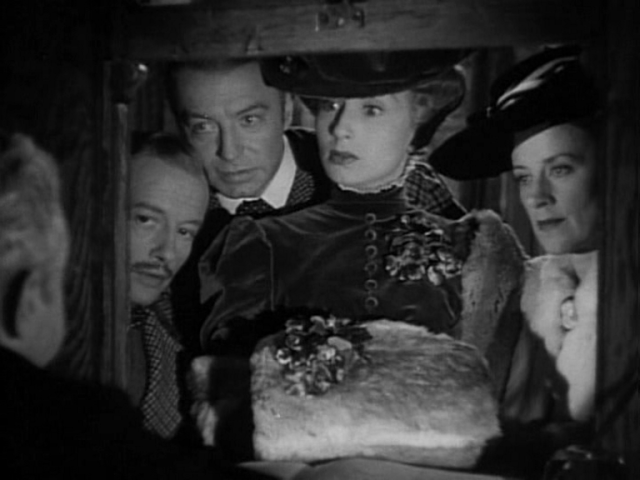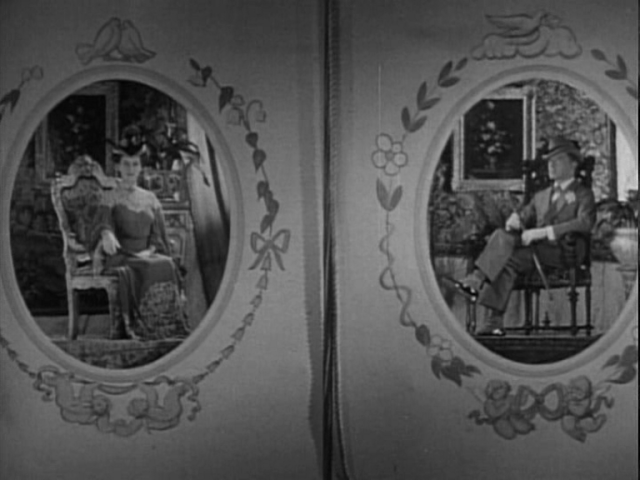
"He's a chin." Such was Josef von Sternberg's summation of Clive Brook, delivered when Marlene Dietrich asked what her leading man in Shanghai Express (1932) was like. Since Brook had already given a sympathetic and subtle performance for Sternberg in Underworld (1927), and since he was one of the few actors who actually liked Sternberg, this remark should perhaps be taken less as an insult, and more as a statement of intent: in Shanghai Express, Sternberg reduces his chum to a chin, rigid and inexpressive.
The real Brook was different, as his sole film as director attests. On Approval (1944) climaxed Brook's acting career (he returned to the screen in 1963 for John Huston, in The List of Adrian Messenger: the rest is silence) and serves as a definitive rebuttal to Sternberg's put-down, as it's a gay, wildly creative, consistently funny comedy. Being based on a play that was then fifty years old doesn't hinder it in the least: Brook, who did the adapting himself, takes this as an opportunity to add jokes about changes in society, film, theater and narrative.
A fusillade of cannon-fire! The rat-a-tat of machine guns! Shells exploding in seawater, blasting great turrets of spume into the air. "Not another war picture," moans the voice-over (instantly recognizable to audiences of the day as the voice of the Gaumont newsreels). And so the narrator leads as back, back in time, through a series of spot gags and historical parodies, to our story.
Brook plays George, who is introduced by the voice-over as the ninth Duke of Bristol. "Tenth," he snaps. George is an impossible man, a drunkard and bounder who has wasted his wealth on women, and is now reduced to renting his ancestral home to Helen (Googie Withers), an American pickle heiress. Brook is somehow stiff and dignified and duke-like, and antic and funny at the same time: a duke in the 1890s can do exactly as he pleases, so George acts like a child, but with the manner of a duke. Googie (so great in It Always Rains on Sunday) rises to the challenge of playing an American by not bothering at all. She concentrates on the comedy and is great. Helen's in love with George, because he's entertaining, but he barely knows she's there. He is, however, considering the need for an enhanced income...
"I have often thought of marriage -"
"Yes?"
"- with distaste."
Meanwhile, George's equally impecunious but far sweeter friend, Richard (the terrific and underrated Roland Culver), is madly in love with the stern Maria Wislack (Beatrice Lillie), a wealthy widow. He admires her so much, and is so daunted by her wealth, that he daren't propose. But Maria has a scheme of her own—

Inviting Richard to spend a month with her at her Scottish island home, she intends to test his suitability as prospective spouse. Plot machinations lead to Helen and George joining them, and the four find out a good deal about each other in the ensuing weeks.
What lifts this above the average theatrical adaptation, or even a good theatrical adaptation (say, Asquith's film of The Importance of Being Earnest) is both deft rewriting and bursts of unfettered creativity. It must have been a funny play to begin with, but Brook keeps it moving, not by the clumsy practice of "opening-out," whereby characters are seen doing the things they only talk about in the play, then come back indoors and talk about them, but by nifty intercutting of parallel action. When Brook does step outside the confines of the play, he's so deft and his additions are so in keeping, one hardly notices. In particular, the disgruntled innkeeper who forces the foursome to stay at Maria's (the plan was to avoid scandal by sending the men to the mainland every night) is a hilarious Scottish stereotype, whose every utterance ends with the sound "oo", as in "We're foo," which is Scots for "full".

It's deplorable that Brook never directed again. Apart from the excellence of the comic timing he produces from his entire ensemble, there's skilled use of framing and music and editing to enhance jokes, or even create them, just by exaggerating a dramatic point. The script's strongest material is the sparring between Maria and George, two spoiled brats who really do deserve each other (and in a nicely-engineered change of partners, they get what they deserve), with Maria snapping acidly and George unfolding his cruel barbs with a honeyed charm (She: "Are you insinuating that I'm difficult?" He: "I am saying, Maria, that one has to like you very much to stay under the same roof as you."). But the film's best stuff is the craziness Brook allows himself, as in a conjoined nightmare in which all four characters re-experience their recent pre-honeymoon in a flurry of jump cuts, instant costume changes, canted angles and surreal visual non-sequiturs. All of this is somehow mixed in with a fantasy of the characters as marble statues of Greek gods and goddesses. The nearest equivalent to this flurry of expressionist mayhem is the extended dream sequence in Glen or Glenda. Of course, Brook's version isn't quite as funny as that, but it's as mad and surprising, and it comes at just the right point to kick the movie up another notch.
Maria (alarmed): "There's a man in my room!"
George: "Why?"


Maybe Brook felt that with this film, he'd said everything he had to say. If so, he had delightfully little to say, but he said it with immense wit. Or, as George puts it, "You have a charming voice. But you seldom sing. That is a great achievement."

***
The Forgotten is a regular Thursday column by David Cairns, author of Shadowplay.